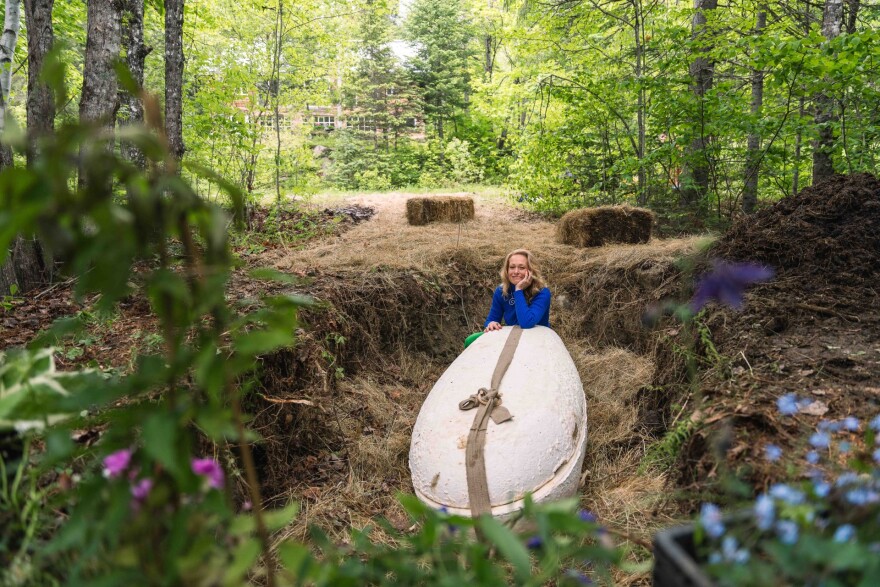In the back woods of Industry, Maine, an intimate gathering was held to honor the life of Mark Ancker. While the ceremony marked the end of Ancker’s 77 years on earth, it also marked the start of something new. The mushroom casket he was buried in — unlike the wood and concrete used in traditional burials — is designed to provide nutrients to the surrounding soil.
After a long week of spring showers, the sun came out as Marsya Ancker-Robert laid her father to rest under some trees as a group of friends and family looked on. An artist and longtime gardener, Anker's longtime wish was to be returned to the land that he loved.
“When I was younger my dad was just like, ‘I want to be buried under a tree naked in the woods on my property’” Ancker-Robert said.
For a long time, she didn’t like the idea of her father being in an “anonymous spot in the woods” where she could not easily visit him. But after he died, she remembered hearing a 2016 TED talk about mushroom caskets. She did some research and realized she'd found a perfect option.
“Here he is, in his little cocoon in the woods, naked, with his favorite things next to him," she said.

The casket, made by Loop Biotech, is made entirely out of mycelium. This allows it to decompose quickly, with full decomposition occurring 45 days after burial. This was key for Ancker-Robert, who alongside family and friends, will be turning the site into a garden.
According to Ancker-Robert, the process of creating the garden has helped her grief.
“It seems weird to say I have a favorite part of the grieving process,” Ancker-Robert said, “[But] every moment of [gardening] was happy because I was daydreaming, and I was imagining. I wasn’t thinking about what I didn’t have. I was thinking about what was going to be.”

The creation of the mushroom casket is part of a larger green burial movement, which advocates replacing traditional embalming chemicals and the use of hardwood caskets with eco-friendly and biodegradable materials. In the United States alone, 4.3 million gallons of embalming fluid, 20 million feet of hardwood, and 1.6 million tons of reinforcement concrete are used in traditional burials.
“I wanted to create a product that would enrich our planet instead of polluting it,” said CEO and founder of Loop Biotech, Bob Hendrikx.
Hendrikx created the Netherlands based company as a grad school project. The company will officially launch in the United States on June 5, World Environment Day.

“I don’t understand how we can put all these chemicals in the soil, the same soil we hopefully someday have our grandchildren feed themselves from,” Hendrikx said, “It doesn’t make sense to me.”
The company also sells directly to the consumer, rather than a third party such as a funeral home. Hendrikx said that means they're able to reduce costs for consumers.

Known as the ‘Loop Living Cocoon’ the casket resembles a futuristic cocoon made of pillowy white mushrooms.
“I wouldn't have felt happy hugging a hard, shiny, pointy casket, but this, it's nice, it's soft and it's gentle," Ancker-Robert said.
While her father did not choose the casket, Ancker-Robert said its concept is fitting for a man who prided himself in not being wasteful and who built his home partially out of salvaged materials. She said that he “would probably get a kick out of the idea."
“My dad is unique, he's an individualist, and he inspired people to be themselves,” Ancker-Robert said.



